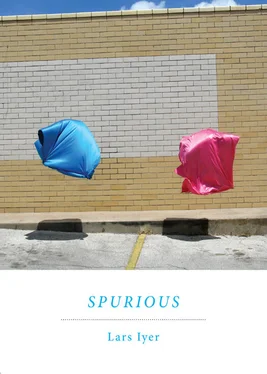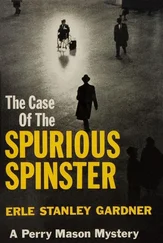On the train to Dundee. ‘What are you doing?’, says W. I’m playing Doom on my mobile phone. — ‘I haven’t seen you open a book for days’, W. says. Later, I take some gossip magazines out of my bag. — ‘Why do you read them?’, says W. ‘Didn’t you bring a book?’ W.’s reading The Star of Redemption again. — ‘A proper book!’, he says. ‘I don’t understand it, though’. He shows me unmarked pages. Pages without any annotations, he says, except for question marks, meaning he doesn’t understand, and exclamation marks, meaning he’s totally lost.
‘So what are you reading, then? Who’s that?’ Jordan, the model, I tell him. — ‘Who’s that?’ Peter André.—‘Oh yes, I like them, they’re funny’. He laughs at the pictures of grossly obese women on the next page. ‘That’s you in a few years’, he says. ‘When do you think you’re going to get as fat as that? It’s going to happen, isn’t it, the way you’re going?’
‘You need a man bag’, says W., and shows me his. ‘You see? You can fit everything into it. Everything and anything’. His bag sits on his hip, and hangs from a leather strap round his shoulders. He decides we should spend the day before the conference looking for a man bag for me. — ‘You need to smarten up’. Rucksacks won’t do. Man bags are the thing. — ‘And you should get rid of that jacket’.
‘So, what have you got in your rucksack?’, W. asks. ‘Go on, show me, I could do with a laugh’. I take out another gossip magazine, and then another. He gasps in horror. — ‘My God, there’s no hope for you’.
Then some snacks. Nuts, first of all. — ‘What kind of nuts are those? Can I have some?’ Then popcorn. — ‘Popcorn? No wonder you’re getting fat’. Then pretzels. — ‘Where do you think you’re going? Up Everest?’ Then a book. — ‘Load of shit! You read too much secondary stuff’. Then my notebook. W. is very pleased with this. — ‘Let’s have a look’.
He flips through the pages. Drawings of cocks, of monkey butlers. He’d taken it from me at a presentation in order to formulate his Hebrew question before he asked it. — ‘Ah, my Hebrew question! My finest hour!’ He’d quoted from the book of Genesis from memory, in Hebrew, like a real scholar, we both remember that. Something about the tohu vavohu , wasn’t that it? — ‘The tohu vavohu ’, says W., ‘exactly’.
Then he tosses the notebook aside. — ‘So, what thoughts have you had? Tell me. I need entertaining’.
We read the papers. Our stomachs hurt. A few days in my company, says W., and he feels iller than he’s ever felt. — ‘Drunk and then ill. Drunk and then ill … That’s your life, isn’t it? How do you do it? How can you live like this?’
What has he got in his man bag? I ask W. — ‘I’ll show you’. He places a large notebook on the desk. In the front, he says, he writes the ideas of others in black ink, and in the back, in red ink, he develops his own ideas.
How many ideas has he had? He opens the notebook for me. — ‘Mmm. Quite a few’.—‘Can I copy some out?’ W. says I can. A book must produce more thought than it itself has , I write. The messianic is the conjunction of time and politics , I write. And the best one, It might be better to speak of a negative eschatology. Anticipation of the future as disaster —I copy that out, too.
Are those ideas? I ask him. They’re on the way to ideas, W. says. W. asks to see my notes. — ‘What’s this drawing of a cock supposed to mean?’
Next, W. takes out The Star of Redemption. — ‘I don’t understand a word. Not — a—word. I don’t suppose you can help me, either’. Next, he sets down a packet of moisturising wipes. What else? — ‘Nothing else. But I’ve got room for everything in my man bag’. I tell W. his man bag is very continental. — ‘Oh yes, I’ll bet Rosenzweig had one. And Kafka’.
Before beginning to give our collaborative presentations, W. and I always dab our wrists and then the skin behind our ears with moisturising wipes. It calms you down, W. says. It prepares you for the task ahead. He takes his wipes everywhere with him. — ‘I learned it from Sal. You see — this is what women can teach you’.
They were handy when we were travelling across Poland. We sat there with flushed faces until W. got his tissues out. — ‘Dab your wrists, where women put on perfume, and then behind your ears’, W. told us, giving out tissues. Suddenly a marvellous coolness descended. — ‘You see!’
‘Why don’t you get rid of that jacket?’, says W. ‘You’ve been wearing it for years. It makes you look fat. It’s completely shapeless’.
W. and I are wearing our flowery shirts. ‘Look at us’, W. sighs, ‘fat and blousy, and everyone else slim and wearing black’.
What’s wrong with us? Why are we never dressed for thought? Take my trousers, for example. They should be pulled up round my waist like those of Benjamin in that famous photograph. But they sag. They droop disappointingly. — ‘You’re a man without hips!’, says W. ‘A man without ideas!’
I’m getting fat, of course. Eventually, I’ll have to wear elasticated trousers like the American professors, W. says. Perhaps it will suit me, my obesity. Perhaps it will give me gravitas.
It’s too hot! I complain. W. reaches in his man bag for a wipe. W.’s prepared for the heat, he says. He watched the weather forecasts. ‘Dundee is either very hot’, he says, ‘or very cold’. He reaches in his man bag for suntan lotion, and applies it to his cheerful face.
W. is an enemy of sunglasses. — ‘Take them off’, he says, ‘you look like an idiot’. But it’s sunny, I protest. — ‘They block your pineal eye’, he says. ‘It needs sunlight’.
The pineal eye’s in the centre of the head, W. explains, but it’s sensitive to light. Without light, you quickly become depressed. — ‘That’s why you’re so morose’, says W. I’m morose, he says, whereas he, who doesn’t wear sunglasses, is joyful. — ‘Joy is everything’, W. says. He is essentially joyful.
‘I’ll bet it smells terrible out there’, says W., looking out of the window of my flat. ‘It does, doesn’t it? You can tell. I’ll bet it really stinks’. You’d never know of course from inside the flat, he says, because the windows won’t open. They’re jammed shut, I tell him, by the flat changing shape. It’s sinking, I tell him. It’s collapsing in the middle.
Later, W. helps me empty the cupboards in preparation for the damp proofers. We have to strip the flat down to a bare frame, I tell him. — ‘God, what’s that smell?’, asks W. as he sets down the pots and pans I pass him in the other room. ‘These are filthy’, he says. ‘How could you let them get like this?’
W.’s worried about my cough. — ‘The damp’s turning you consumptive’, he says. Even he’s developing a cough, and he’s only been here a few hours. — ‘How can you live like this? How can you get anything done?’
W.’s house is perfectly made for work, he says. His quiet, book-lined study on the second floor; his desk and laptop; the view over Plymouth roofs is perfect inspiration, he says. He has a sense of living above the world rather than living below it in the mud, as I do.
‘All your worldly possessions’, says W., looking round the room. ‘Is this what you’ve amounted to?’ Pots and pans, sticky with filth; rusty tins of mackerel and tomatoes; a duvet soaked in spilt fabric conditioner: ‘Yes, this is what it’s come to’, W. says, ‘it all ends here’.
I must have a death-drive, W. surmises. That’s the only thing that could explain it. I must, on some level, want to destroy myself. — ‘Just throw this stuff out’, W. says, ‘all of it. You don’t cook here, do you?’ There’s no power in the kitchen, I tell him. There’s no electricity. — ‘My God. How can you live like this?’, says W., his voice high with incredulity. ‘It wouldn’t have got this bad if you lived with someone’.
Читать дальше












